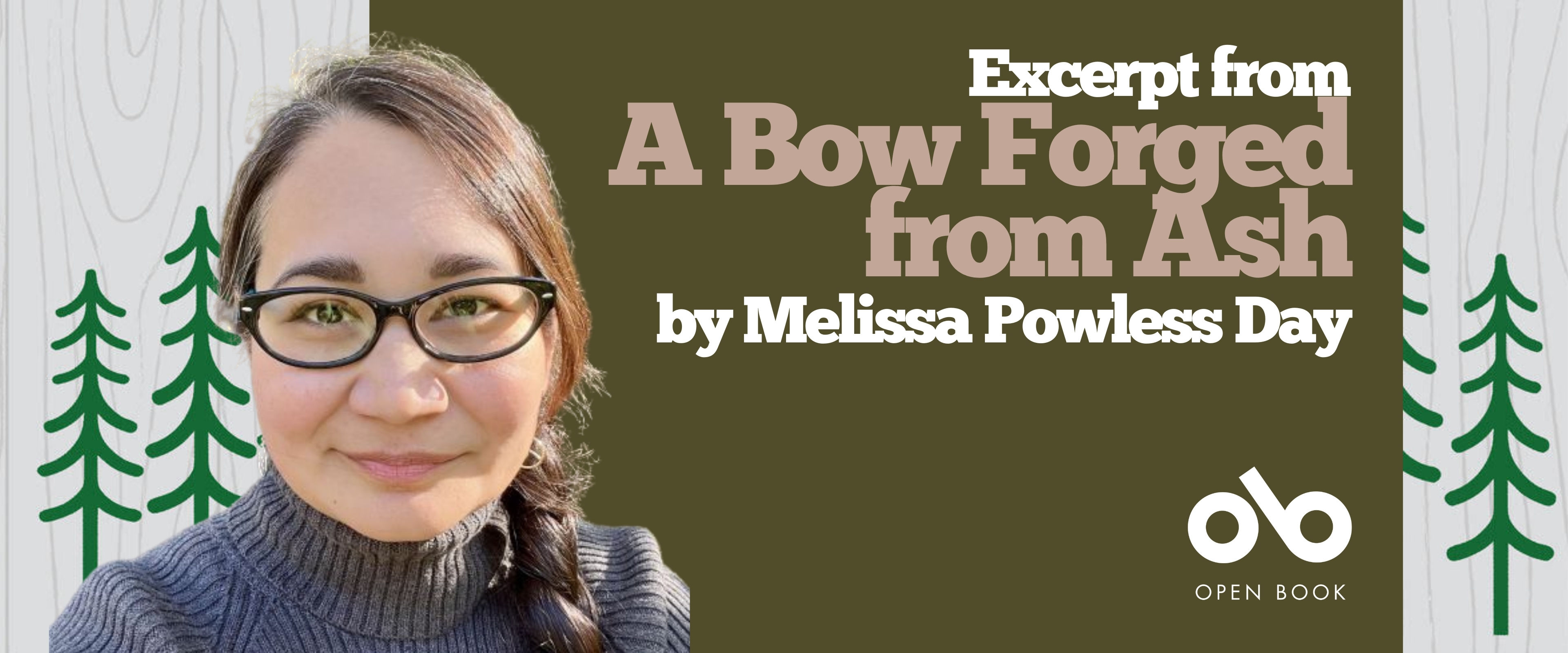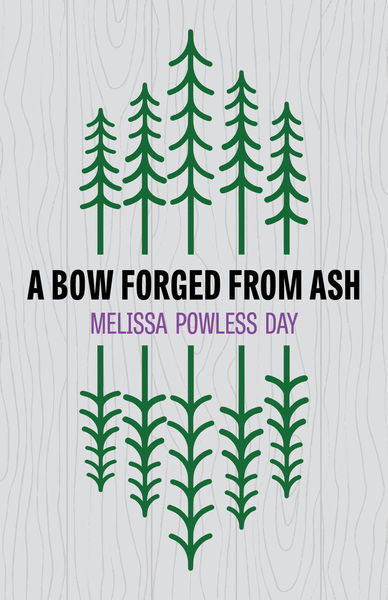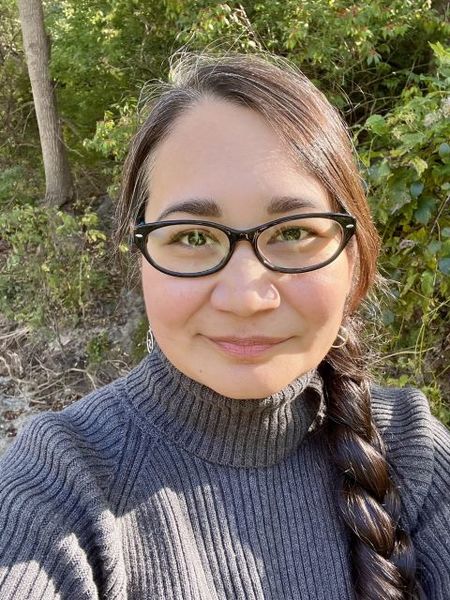Read an Excerpt from A BOW FORGED FROM ASH by Melissa Powless Day
Melissa Powless Day invites readers into a powerful journey of reclamation in her remarkable collection A Bow Forged from Ash (Palimpsest Press). With precision and heart, she explores what it means to belong and to return, weaving together lived experience, ancestral memory, and the strength of family ties. Her work is deeply personal and widely resonant, reminding us of the transformative possibilities of poetry when it speaks from the heart of community and land.
The poems in this collection are alive with the landscapes of Southwestern Ontario and the nations Powless Day calls home. They trace a path through identity, responsibility, and the search for wholeness, carrying with them the pulse of history and the enduring voices of those who came before. Each poem is an act of seeking and a declaration of strength, a bowstring drawn back with care and released with conviction.
A Bow Forged from Ash is more than a collection of poems. It is a testament to the inseparability of reclamation and resistance, a reminder that walking proudly in one’s Indigeneity is itself a form of defiance against colonial erasure. With grace and fierce clarity, Powless Day restores bonds across generations and offers readers a collection that is as lyrical as it is necessary.
Check out this spellbinding excerpt from the collection, right here on Open Book!
Excerpt from A Bow Forged From Ash
Northern Lights
Pitch black cold …
December?
Nogojiwanong.
I remember the warmth of your hand.
The warmth in our throats
A beautiful roar
of women making
thunder
We are not afraid, you told me.
This is us reclaiming.
Your CanLit News
Subscribe to Open Book’s newsletter to get local book events, literary content, writing tips, and more in your inbox
That deep night protest –
voices, electric
buzzing,
willful.
When late hours caught up with little legs, you put me on your shoulders.
Breaching the crowd …
surfacing
bright hats and scarves, people
undulating.
Pinks, yellows, greens – dancing light meant to ward away wendigos.
We were vibrations to sunder silences.
I was too young
to understand then,
why we needed medicine
the foreboding of the night.
To me,
You conjured Wawatay and set me on its back.
That’s how I knew,
You
were magic.
Bezhgoozhi
Time doesn’t stop on Walpole, just flows differently. A river melting into a lake – there’s more room where there’s more history. Currents hot and cold, fast and slow can spread their arms and legs, can dance and mingle with the old waters, the deep waters. Time on Walpole is like blue becoming green.
August sunlight is the colour of elder bullrush, not gold but something richer amidst the upstart greens that drift with us. The brown spikes are these beings’ heads and they watch us with a stalky sway. A thousand eyes called seeds packed atop a single reed. In the fall, how many secrets rest in the wishes children blow into the wind?
Do they know where the horses went?
We came here in our childhood, searching for bezhgoozhi. The nektosha of the Pottowatomi. Those wild things Shaagnaash called mustangs. All fire and prairie running free on our Walpole whirlpool island.
Do those legs know how to stop?
Fish gotta swim. A bird’s gotta fly. Horses are meant to run.
We saw one once, through the grasses and cat-tailed keepers. First, shimmers of sound and motion, drumbeats against the earth. Then, a flash of copper. Reeds. She stood before us, a mare that called the wind with her hooves, and billowed along the shoreline, churning sand and water as one. Bezhgoozhi.
Now, the sand is still. Beach and waters only meet. We skim here to the shallows, wading with bullrush, trolling for glimpses we’ve already seen.
But when she spoke to us, she reared, and we saw how humans grew from horses, how our bodies bloomed from their strong backs, how our thighs were meant for clinging, their manes meant for grasping, two beings breathing, beating thunder into dirt.
We’re almost through the shoal, Keegan breathes, nodding to the thinning crowds of brown-eyed watchers. Young and old defend the shore, warpoles for four-leggeds that ripple through the ebb and flow of rivers, lakes and two cousins’ search for wild. We never told a soul about her.
What are bullrush meant for anyway? Keegan mutters. Where gritty, salty disappointment used to sit, there is, now, a bitter resignation in the gut. The way butterflies need their dust, wings cannot be touched, bezhgoozhi cannot stop, running is what keeps her alive. She will always run and we will always look, but looking doesn’t mean we’re meant to find.
What are bullrush meant for?
Catching things the wind no longer carries, slowing boats, hiding from cousins the reason why Grams complain of horsehair when our own manes need braiding.
Advice from my mother on a dreamwalk
Be loud
So the monsters will hear you
Carry kindness as contraband
Stow it away in secret pockets
So you can never be robbed of it
Tread heavily
So the world feels your steps
Break bones with your wit
Flash sharp words instead of fists
So silence can never starve you
Follow butterflies
So you forget the road
Flex anger like currency
Plant shackles to grow memory
Make blankets out of body bags
And,
If ensnared,
Offer wrath
Field Poem 3
Sunlight
In the homestead field
Finds you
Unfaltering
Bright fingers – warm like hard work
Beading sweat across brows
Wild grasses and clover converse
On this ancestral ground, I feel tangential
Like fiddleheads,
Questions curling
Inwards
My cousin makes bows
Shows me how two fingers draw velocities with a snap
Warns me of the learning curve
The flesh sacrifice
To fly an arrow shaft
Hands me a bow, hand-forged from ash
I teach all the cousins, and they pick it up quick.
Fumbling,
I doubt my lineage
Athleticism articulated by a limp arrow on the grass
How do we return?
I feel tangential
Touching bows
Two points – the making of the bow, the loosing of the arrow
Then, diverging
Arrows wobble in the air
Too fast to see
Nanda-gikendam
Seeking—
I am looking for the person that comes after
The skin behind the scab
Sunlight, an interrogation
No dark spaces to shrink into
Auntie nudges bravery out of me
My cousin doesn’t laugh
Persistence a callus
I do not intersect (just yet)
I am a line, a ray aiming for the
Curvature of the bow, shallow parabola of the arrow
As though the formula of the tangent
Might mark coordinates for
Return
In homestead sun
We draw stances
Immemorial
A bowstring
Pulled back
Dilates time
Shadows might be ancestors
Silhouettes the land knows
Of hunts—
Bodily
I am in the sun
On the field
Standing with
My cousin
Auntie and Uncle near
Drawing sinew back
Muscles forget/remember
Tension of anticipation, breath, shoulders taut—
How do we return?
Is it in the bow, or the arrow?
Rejoining trajectories, a practice of geometry
Solvable, yet
In the sun
On the field
Our blood recalls
Not formula, but
Relationship, between
Fingers and fletching
Breath and arrow
Body and bow
Cousins, aunties, uncles
I let go
The arrow flies
Tearing flesh
From my finger
Fiddleheads unfurl
In the sun
____________________________________
Melissa Powless Day is Anishinaabe and Kanien’kehá:ka from Bkejwanong Territory (Walpole Island First Nation), with family ties in Six Nations of the Grand River Territory. Her poetry has appeared in the Temz Review, TNQ, the Windsor Review, Luna Station Quarterly and Yellow Medicine Review, and her first chapbook, Secondhand Moccasins, was published in 2023 by Anstruther Press and shortlisted for the bpNichol Chapbook Award. Melissa is also a scholar and educator who is currently pursuing a PhD in Indigenous Education at Western University. She serves as the chair for Western’s Indigenous Writers’ Circle and as a Visiting Cultural Teacher for the London District Catholic School Board.






